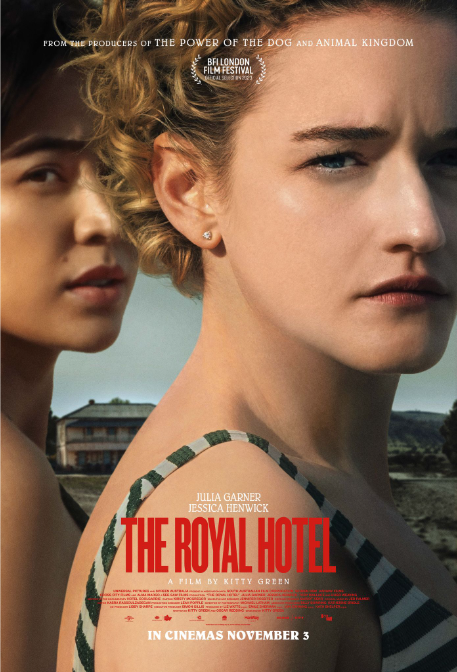Eye For Film >> Movies >> The Royal Hotel (2023) Film Review
The Royal Hotel
Reviewed by: Amber Wilkinson

Kitty Green returns to her native Australia for her latest film. Like her last, The Assistant, it was inspired by a true story - then Harvey Weinstein, this time, a documentary about a pair of Scandinavian backpackers, Hotel Coolgardie - and again she zeroes in on toxic masculinity, although not to quite such efficient effect.
Hanna (Julia Garner) and Liv (Jessica Henwick) are on tour when we meet them, but on finding themselves low on cash decide to head to the Outback to make some money doing live-in bar work. Pretending to be Canadian because “everyone loves Canadians” seems like a laugh until they get there but soon they’re subject to micro-aggressions that feel as though they could kick-off into full blown violence at any time.
The bar is run by the rough-and-ready, and thanks to alcohol, none-too-steady Billy (Hugo Weaving) and his no-nonsense other half Carol (Ursula Yovich), who is the closest thing to an ally these young women get. The clientele, meanwhile, are mostly male and sitting somewhere on the veiled threat spectrum. Young Matty (Toby Wallace) may seem quite a harmless cheeky chappy with the hots for Hanna but he doesn’t look so innocuous after the wrong amount of shots, while Teeth (James Frecheville) is outwardly pleasant but increasingly fixated on Liv. Buzzing most threateningly among the barflies is Dolly (Daniel Henshall), who exudes a constant air of barely repressed violence. Inevitably, when a former dalliance (Herbert Nordrum) shows up from Sydney to ‘help’ he also turns out to be less than a knight in shining armour.
The feeling that something bad could happen at any moment permeates the mood, and is heightened by Liv’s penchant for drink, which also makes her unpredictable. Hanna, played with a twitchy determination by Garner, is constantly watchful, for all the good it might do her. Green doesn’t immediately dish out the violence this sort of tense atmosphere might be expected to yield. Instead she magnifies the microaggressions faced by countless women at the hands of countless men every day, showing that even if things don’t blow up in your face, the very fact that they feel on a hair-trigger is enough to your send stress levels through the roof if you’re on the receiving end.
Despite the grip on mood, enhanced by the paradoxic sense of both isolation and claustrophobia of being in the bar in the middlle of nowhere where the clientele never change, there’s still a sense of taking a run over familiar misogynist jumps. The relationship between Liv and Hanna also becomes increasingly hard to believe as things escalate. While the men’s reactions to the women and each other feel all too plausible, the way the women behave towards one another seems highly unlikely especially as we’re given to believe this is a friendship long in the making and the threats begin to crystallise. This is partially because Green pours the most complexity into Hanna, leaving Liv feeling pale in character and hazy in motivation by comparison. Her truth bombs about toxic masculinity work better when she lets them tick loudly than they do when she makes them explode.
Reviewed on: 11 Oct 2023
















